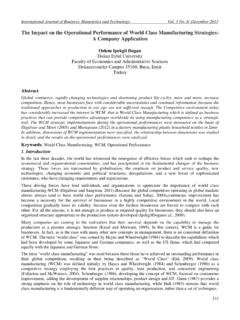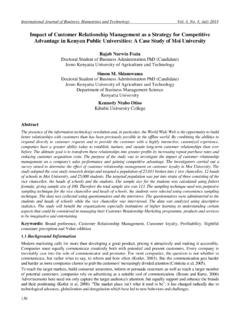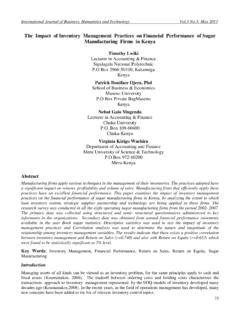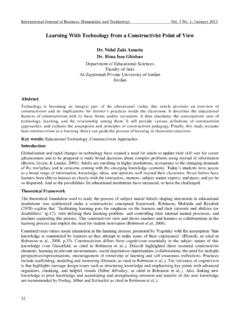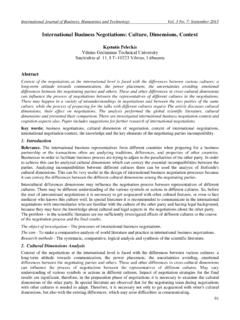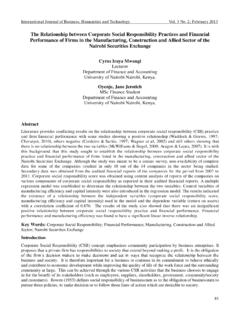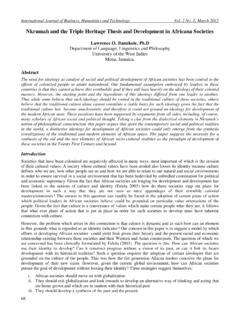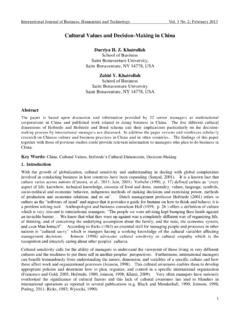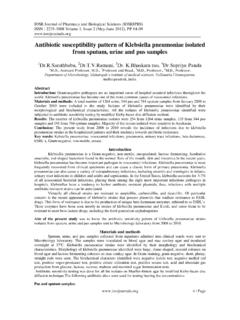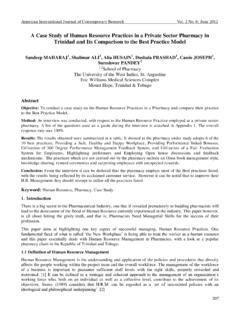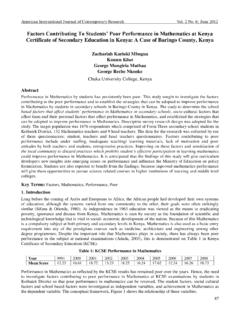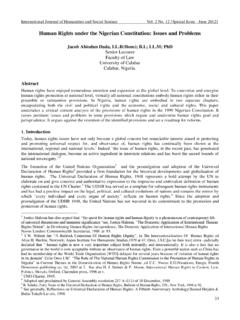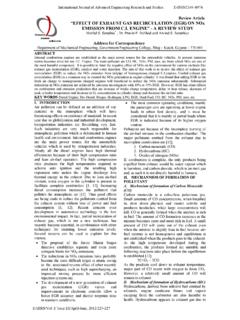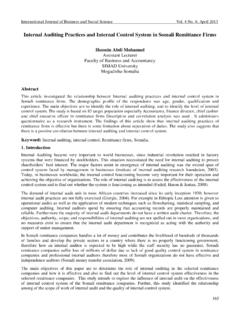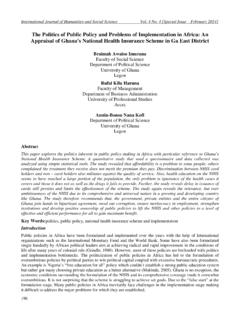Transcription of Non-Formal Education: Is It Relevant or Obsolete?
1 International Journal of Business, Humanities and Technology Vol. 2 no . 4; june 2012 11 Non-Formal education : Is It Relevant or Obsolete? Dr. Akanisi Kedrayate Dean, Faculty of Arts, Law and education Doctor of Philosophy - University of New England Australia Introduction The importance of Non-Formal education in the Pacific Region cannot be overemphasized. This presentation argues that it is very Relevant and contributes significantly to national developments and in its flexible approaches, seen as a means of addressing some of the pertinent global issues facing the nations in the Pacific Islands.
2 As global issues affect the people culturally, socially, economically and politically, the role of Non-Formal education becomes very critical in how these issues are addressed. The role of Non-Formal approaches to adult learning, gender equality, health, sustainable environment and peace and conflict resolution are being widely advocated by both government and non-government organizations in the Pacific Island nations. Broadly conceived, Non-Formal education is not a new concept but an educative process that has been in existence in pre-literate societies.
3 Increasing evidence exists to substantiate the claim that Non-Formal education is an old concept with a new name. In the Pacific Island nations Non-Formal education is integrated in the life style of the people. This article first examines Non-Formal education in the traditional context, and then discusses the reasons for NFE in the region, its conceptualization, and its contribution to the needs in the Pacific Region. education in the Pacific Traditional Context Non-Formal education was practiced in many Pacific Island nations before schooling became institutionalized.
4 The transmission of knowledge, skills and attitudes to the young is an important activity for the sustainability of many these Pacific societies Thus, in many traditional societies, the young learned the knowledge and skills for economic and social survival in a very organized and youths learn the roles ands responsibilities expected of their gender and specific tribe. The experienced and recognized community members are the teachers. Learning and teaching was community-based and was through imitation, observation and on-the-job experience.
5 Although the method and strategy of what was learned was limited and confined, it was suited to the communal way of life, the resources available and their ability to meet extended and community needs. Learning/teaching was an important process as it ensured continuity and sustainability of community life. During the early day of Christianity, there were Non-Formal education classes in literacy, agriculture and home economics and hygiene. But such courses were taken over by formal education and the traditional forms of structured learning were no longer valued, although they continue to affect social and cultural life in the rural communities.
6 formal education was seen to be more prestigious as it led to white-collar jobs mainly in the modern sector of society. formal education will continue to contribute an important role in the preparation of a literate and educated human resource for the modern economy. However, it has to be accepted that FE cannot and will not be able to meet the aspirations of school leavers and other learners who have missed out through the formal education system. Why Non-Formal education Is it Relevant ? In 1960 s and 1970 s NFE was perceived to offer second chance education to those who had been pushed out from the formal system.
7 Various governments have established vocational education programmes to train youths in Relevant skills. In Fiji, the multi-craft programmes was established to train school leavers to acquire self-employment skills to generate their livelihood. Centre for Promoting Ideas, USA 12 While some of the projects produced favourable outcomes, many programmes were not successful because parents did not support the concept and perceived it be second class to FE.
8 They preferred their children to acquire academic education to prepare them for white-collar jobs in the formal sector (Sharma, 1989). However, it was recognised that the rapid technological and social changes demanded continuing education and re-training in different knowledge and skills for those in modern employments and in the rural community. formal education has always acquired most of the educational resources. In recognition of the need for access to new skills and knowledge by those who have missed out on schooling has led to the establishment of a number of education and training programmes for adults and youths by both government and non-government organizations.
9 Required resources were allocated but still minimum compared with FE resources. There is a greater awareness and acknowledgement of the need for Non-Formal education in the Pacific Island nations and the role it contributes to nation building. For example in Fiji, an estimated 14,000 young people enter the labour market every year, but only about 8,000 find jobs or further training. Many young people require openings to develop skills and to enable them to earn their living. Many island governments with the support of outside funding have established skill training institutions and also conduct, short training courses for employable skills.
10 For example in the Solomon Islands there are vocational centres set up in provinces to offer courses to youths and school leavers. The Conceptualisation of Non-Formal education Broadly viewed, Non-Formal education is not a new concept. Increasing evidence exists that it is an old concept with a new name. Non-Formal education as a concept can be viewed into three perspectives. There is substantial evidence to support that NFE as concept has been discussed and implemented in various contexts. Three perspectives which are as follows: i) NFE as a Process ii) NFE as a System iii) NFE as Setting In discussing each concept, its practical applications are provided to support and affirm the line of argument of its relevance.
